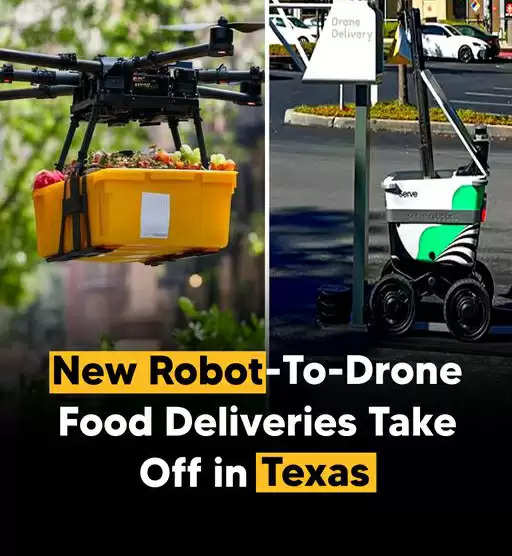Serve Robotics and Wing Launch Hybrid Drone and Robot Delivery Service in Dallas

Serve Robotics and Alphabet's Wing are collaborating to develop a hybrid delivery service that integrates robotic and drone technologies, marking a significant step towards revolutionising the delivery sector. The two businesses unveiled a brand-new pilot program that will begin in Dallas with the goal of improving food delivery and bringing drone services to cities with constrained resources.
The initial half of the route will be completed by Serve Robotics' fleet of sidewalk delivery bots thanks to the agreement. Within a few blocks, these self-driving robots will pick up food orders at restaurant curbside outlets and deliver them to a prearranged location. The food will be transferred from the robot to a Wing drone by a Wing AutoLoader when the order gets close to its destination. The drone will then take off and fly at up to 65 mph to deliver the order right to the customer's door. Compared to conventional ground-based techniques, the distribution may be completed more quickly and effectively thanks to the drones' six-mile range.
This cutting-edge business attempts to solve some of the major issues that the food delivery sector faces, such as workforce shortages, traffic jams, and the demand for quicker service. The new delivery method claims to drastically cut delivery times by utilising both robotic and drone technology, especially in urban areas where traffic can sometimes create delays.

Bringing Technologies Together for a Smooth Experience
Serve Robotics and Wing's partnership is well-positioned to capitalise on the complementing advantages of each company's technological offerings. Food is delivered quickly and safely because to Serve Robotics' skill in manoeuvring congested metropolitan streets and pavements. The company is well-known for their pavement delivery robots. Leading drone delivery company Wing has a lot of expertise using airborne technology to cut through gridlock and deliver things quickly.
The two technologies work together to create a potent multi-modal delivery solution. While Wing drones handle the "long haul," flying over roads and traffic to deliver the order fast and effectively, Serve's robots tackle the "last mile" difficulty, which is moving food from the restaurant to a nearby transfer point. Because of its hybrid approach, the service can reach clients more quickly than with traditional techniques, which makes it perfect for crowded urban locations with heavy traffic.
Urban Delivery's Future
This ambitious pilot project has picked Dallas as its starting location because of the city's infrastructure supporting new delivery models and its burgeoning tech industry. This service's deployment, which is anticipated to start in the upcoming months, will also aid in extending drone delivery capabilities into regions that could otherwise be challenging to service because of staffing shortages or space restrictions.
This collaboration represents a big step forward for Serve Robotics and Wing in the larger endeavour to transform urban logistics in the future. These hybrid technologies could help change the way food and goods are delivered in urban areas as populations grow and the need for quicker, more efficient services rises.
The objective is to improve the system to the point where it can be extended to further areas, even though the service is still in its early phases. If it is effective, it may open the door for comparable partnerships in other cities and establish new benchmarks for delivery methods including drones and robots.
This alliance offers an intriguing look into the automated, contactless service of the future, where technology enables faster and more efficient fulfilment of customer demand than ever before by combining ground and air-based delivery.
--
